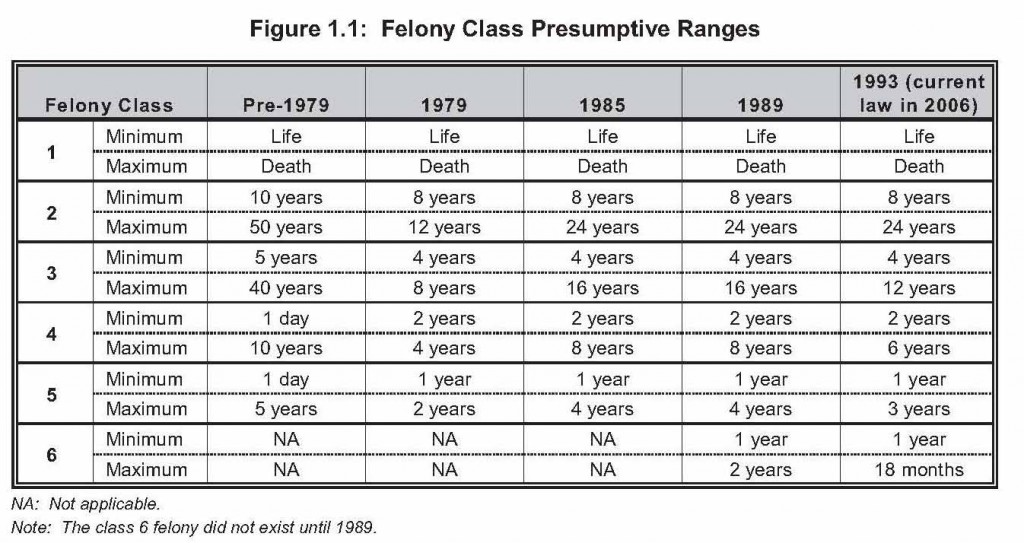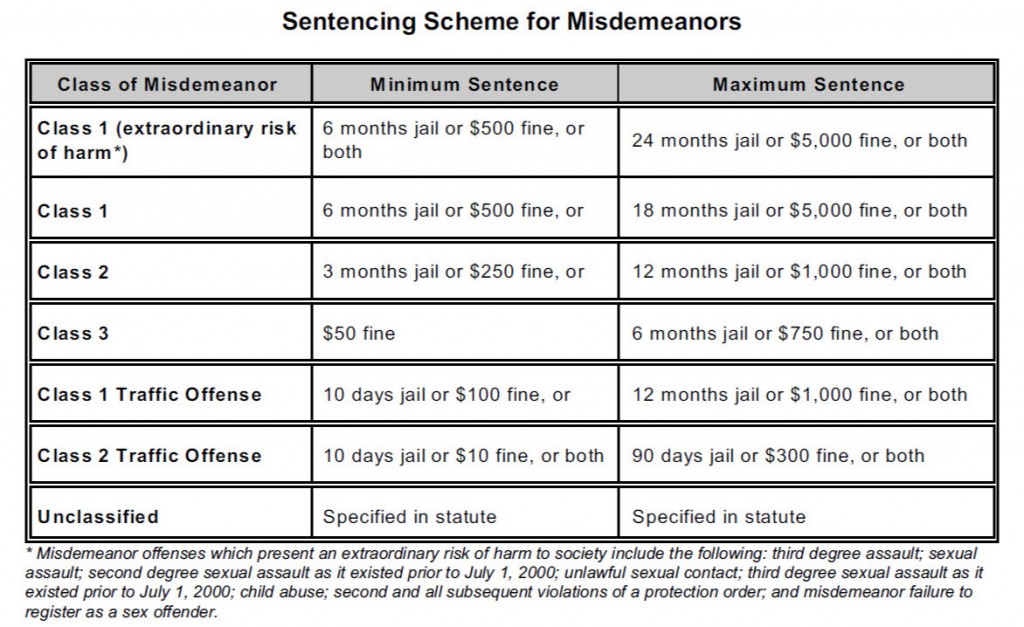

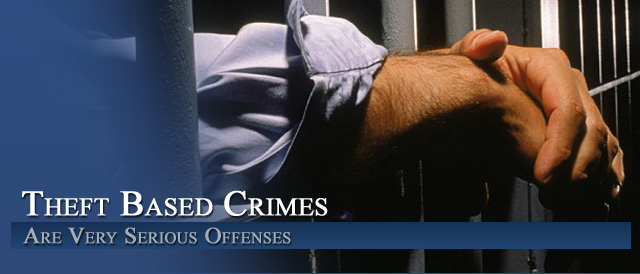

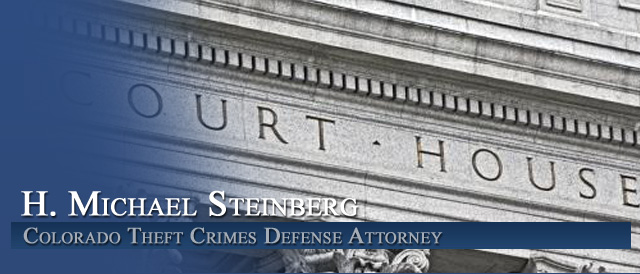
A Guide To The Crimes Of Theft Under Colorado Law
By H. Michael Steinberg Colorado Theft Crimes Criminal Defense Lawyer – Attorney
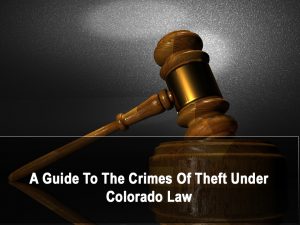 A Guide To The Crimes Of Theft Under Colorado Law – The Colorado crimes of theft are primarily listed in Section 18-4-401. That law, reprinted below, contains five sections A through E – that identify the different methods of committing the crime of theft in this state.
A Guide To The Crimes Of Theft Under Colorado Law – The Colorado crimes of theft are primarily listed in Section 18-4-401. That law, reprinted below, contains five sections A through E – that identify the different methods of committing the crime of theft in this state.
To understand the Colorado crime of theft – you must begin with the statute Section 18-4-401(1)(a–e). If you are charged with the crime of theft in Colorado, with few exceptions, you will be charged with one of these sections.
§ 18-4-401. Theft
(1) A person commits theft when he or she knowingly obtains, retains, or exercises control over anything of value of another without authorization or by threat or deception; or receives, loans money by pawn or pledge on, or disposes of anything of value or belonging to another that he or she knows or believes to have been stolen, and:
(a) Intends to deprive the other person permanently of the use or benefit of the thing of value;
(b) Knowingly uses, conceals, or abandons the thing of value in such manner as to deprive the other person permanently of its use or benefit;
(c) Uses, conceals, or abandons the thing of value intending that such use, concealment, or abandonment will deprive the other person permanently of its use or benefit;
(d) Demands any consideration to which he or she is not legally entitled as a condition of restoring the thing of value to the other person; or
(e) Knowingly retains the thing of value more than seventy-two hours after the agreed-upon time of return in any lease or hire agreement.
(1.5) For the purposes of this section, a thing of value is that of “another” if anyone other than the defendant has a possessory or proprietary interest therein.
…
[HMS – The possible penalties for the Colorado crimes of theft will turn on the amount of the loss.]
(2) Theft is:
(b) A class 1 petty offense if the value of the thing involved is less than fifty dollars;
(c) A class 3 misdemeanor if the value of the thing involved is fifty dollars or more but less than three hundred dollars;
(d) A class 2 misdemeanor if the value of the thing involved is three hundred dollars or more but less than seven hundred fifty dollars;
(e) A class 1 misdemeanor if the value of the thing involved is seven hundred fifty dollars or more but less than two thousand dollars;
(f) A class 6 felony if the value of the thing involved is two thousand dollars or more but less than five thousand dollars;
(g) A class 5 felony if the value of the thing involved is five thousand dollars or more but less than twenty thousand dollars;
(h) A class 4 felony if the value of the thing involved is twenty thousand dollars or more but less than one hundred thousand dollars;
(i) A class 3 felony if the value of the thing involved is one hundred thousand dollars or more but less than one million dollars; and
(j) A class 2 felony if the value of the thing involved is one million dollars or more.
Classification of Colorado Theft Crimes And Possible Penalties
Felony Crimes Penalties Chart
Misdemeanor and Petty Crimes Penalties Chart
The Colorado Jury Instructions Of Law – Provide The Best Road Map To Understanding The Theft Crime In Your Case
To fully comprehend whether the State of Colorado can actually prove beyond a reasonable doubt that you are guilty of the section of the crime of theft with which you are charged – you must understand the “elements” of the crime which you are accused of committing.
Colorado Section 18-4-401, excerpted below, consists of Section (1) followed by Five Subsections – (1) A-E. What follows are the subsections (1) A through E from the law. Following the law are the Colorado Jury Instructions that “break out” further each of these sections so that Colorado Juries – and now you – can understand the elements of each crime:
1) A person commits theft when he or she knowingly obtains, retains, or exercises control over anything of value of another without authorization or by threat or deception; or receives, loans money by pawn or pledge on, or disposes of anything of value or belonging to another that he or she knows or believes to have been stolen,
and:
(a) Intends to deprive the other person permanently of the use or benefit of the thing of value;
(b) Knowingly uses, conceals, or abandons the thing of value in such manner as to deprive the other person permanently of its use or benefit;
(c) Uses, conceals, or abandons the thing of value intending that such use, concealment, or abandonment will deprive the other person permanently of its use or benefit;
(d) Demands any consideration to which he or she is not legally entitled as a condition of restoring the thing of value to the other person; or
(e) Knowingly retains the thing of value more than seventy-two hours after the agreed-upon time of return in any lease or hire agreement.
The Colorado Jury Instructions “Break Out” The Essential Elements Of Each Theft Crime
Theft (Intent to Permanently Deprive)
The elements of the crime of theft (intent to permanently deprive) are:
1. That the defendant,
2. in the State of Colorado, at or about the date and place charged,
3. knowingly,
[4. obtained, retained, or exercised control over anything of value of another,
5. without authorization or by threat or deception, and]
[4. received, loaned money by pawn or pledge on, or disposed of,
5. anything of value or belonging to another that he [she] knew or believed to have been stolen, and]
6. intended to deprive the other person permanently of the use or benefit of the thing of value.
Theft (Knowing Use, Concealment, or Abandonment)
The elements of the crime of theft (knowing use, concealment, or abandonment) are:
1. That the defendant,
2. in the State of Colorado, at or about the date and place charged,
3. knowingly,
[4. obtained, retained, or exercised control over anything of value of another,
5. without authorization or by threat or deception, and]
[4. received, loaned money by pawn or pledge on, or disposed of,
5. anything of value or belonging to another that he [she] knew or believed to have been stolen, and]
6. knowingly,
7. used, concealed, or abandoned the thing of value,
8. in such manner as to deprive the other person permanently of its use or benefit.
Theft (Intentional Use, Concealment, or Abandonment)
The elements of the crime of theft (intentional use, concealment, or abandonment) are:
1. That the defendant,
2. in the State of Colorado, at or about the date and place charged,
3. knowingly,
[4. obtained, retained, or exercised control over anything of value of another,
5. without authorization or by threat or deception, and]
[4. received, loaned money by pawn or pledge on, or disposed of,
5. anything of value or belonging to another that he [she] knew or believed to have been stolen, and]
6. used, concealed, or abandoned the thing of value,
7. intending that such use, concealment, or abandonment would deprive the other person permanently of its use or benefit.
Theft (Demanding Consideration)
The elements of the crime of theft (demanding consideration) are:
1. That the defendant,
2. in the State of Colorado, at or about the date and place charged,
3. knowingly,
[4. obtained, retained, or exercised control over anything of value of another,
5. without authorization or by threat or deception, and]
[4. received, loaned money by pawn or pledge on, or disposed of,
5. anything of value or belonging to another that he [she] knew or believed to have been stolen, and]
6. demanded any consideration to which he [she] was not legally entitled,
7. as a condition of restoring the thing of value to the other person.
Theft (Retaining)
The elements of the crime of theft (retaining) are:
1. That the defendant,
2. in the State of Colorado, at or about the date and place charged,
3. knowingly,
[4. obtained, retained, or exercised control over anything of value of another,
5. without authorization or by threat or deception, and]
[4. received, loaned money by pawn or pledge on, or disposed of,
5. anything of value or belonging to another that he [she] knew or believed to have been stolen, and]
6. knowingly retained the thing of value more than seventy-two hours after the agreed-upon time of return in any lease or hire agreement.
Other Less Charged Colorado Theft Crimes
Colorado law also identifies several other specific types of theft, not addressed here, which include:
• Theft by receiving (stolen property) (§ 18-4-404)
• Theft of rental property (§ 18-4-402.)
• Theft of trade secrets (§ 18-4-408.)
• Aggravated motor vehicle theft (§ 18-4-409.)
• Theft of medical records (§ 18-4-412.)
• Theft by resale of ski lift ticket or coupon (§ 18-4-416.)
• Fuel piracy (§ 18-4-418.)
• Newspaper theft (§ 18-4-419.)
• Theft of sound recordings (§ 18-4-601),
• Theft of cable television services (§ 18-4-701), and
• Theft of public transportation services (§ 18-4-801.
What If You Have “Priors”- Multiple and Colorado Penalties For Theft in Colorado
Under Colorado law, anyone convicted of felony-level theft involving merchandise taken from a store, and whose criminal record already includes two felony theft convictions involving theft from a store within the last four years, will receive a sentence of at least the minimum term allowed for the offense, and will not be eligible for probation or a suspended sentence. (Colo. Rev. Stat. § 18-4-413.)
Understanding Why People Commit Theft And Defending The Colorado Theft Case
There are obviously many reasons why individuals find themselves charged with theft.
I have argued in the past the impact on my clients of something called “Strain Theory” by Robert Merton.
Strain theory takes the position that otherwise law-abiding people who are under great pressure may resort to crime when there is a great disparity between the goals of those people and the development of their lives.
When individuals are faced with a gap between their lifetime goals related to finances or money related and the result of terrible economic impacts – strain occurs and they may commit the crimes of theft.
When faced with “strain,” people have five ways to adapt:
1. Conformity: pursing cultural goals through socially approved means.
2. Innovation: using socially unapproved or unconventional means to obtain culturally approved goals. (stealing to achieve financial security.)
3. Ritualism: using the same socially approved means to achieve less elusive goals (more modest and humble).
4. Retreatism: to reject both the cultural goals and the means to obtain it, then find a way to escape it.
5. Rebellion: to reject the cultural goals and means, then work to replace them.
The strain of our changing economy on real individuals who have planned on providing for their child’s education, or living in decent housing or driving a reliable car – has caused otherwise moral individuals to commit crimes related to theft.
One Example – Colorado Shoplifting Cases
Shoplifting, when compared to embezzlement requires a very different kind of defense. Shoplifting is a psychological, not an issue of greed or poverty, for many of my clients.
Shoplifters often commit the crime when they are struggling with their own personal conflicts and needs. Often it is “depression” that explains why many people are compelled to steal. For example many individuals shoplift around the time of their birthday and or around the holidays.
Furthermore the Diagnostic and Statistical Manual of Mental Disorders (DSM-IV) identifies certain acts of shoplifting as the result of an “Impulse Disorder” known as Kleptomania.
The following five criteria apply to this diagnosis.
1. Recurrent failure to resist impulses to steal objects that are not needed for personal use or their monetary value.
2 .Increasing sense of tension immediately before committing the theft.
3. Pleasure or relief at the time of committing the theft.
4. Stealing is not committed to express anger or vengeance and is not in response to a delusion or hallucination.
5.The stealing is not better accounted for by Conduct Disorder, a Manic Episode, or Antisocial Personality Disorder.
Kleptomania is far more prevalent than researchers had originally believed.
A Guide To The Crimes Of Theft Under Colorado Law
If you found any of the information I have provided on this web page article helpful please click my Plus+1 or the Share buttons for Twitter and Facebook below so that others may also find it.
The reader is admonished that Colorado criminal law, like criminal law in every state and at the Federal level, changes constantly. The article appearing above was accurate at the time it was drafted but it cannot account for changes occurring after it was uploaded.
If, after reading this article, you have questions about your case and would like to consider retaining our law firm, we invite you to contact us at the Steinberg Colorado Criminal Defense Law Firm – 303-627-7777.
Never stop fighting – never stop believing in yourself and your right to due process of law. You will not be alone in court, H. Michael will be at your side every step of the way – advocating for justice and the best possible result in your case. H. Michael Steinberg is passionate about criminal defense. His extensive knowledge and experience of Colorado Criminal Law gives him the edge you need to properly handle your case
 ABOUT THE AUTHOR: H. Michael Steinberg – Email The Author at:
ABOUT THE AUTHOR: H. Michael Steinberg – Email The Author at:
A Denver Colorado Criminal Defense Lawyer – or call his office at 303-627-7777 during business hours – or call his cell if you cannot wait and need his immediate assistance – please call 720-220-2277.
“A good criminal defense lawyer is someone who devotes themselves to their client’s case from beginning to end, always realizing that this case is the most important thing in that client’s life.”
You should be careful to make a responsible choice in selecting a Colorado Criminal Defense Lawyer. We encourage you to “vet” our firm. Over the last 35 plus years – by focusing ONLY on Colorado criminal law – H. Michael has had the necessary time to commit to the task of constantly updating himself on nearly every area of criminal law, to include Colorado criminal law and procedure and trial and courtroom practice.
Putting more than 40 years of Colorado criminal defense experience to work for you.
H. Michael works hard to get his clients the best possible results in and out of the courtroom. He has written, and continues to write, extensively on Colorado criminal law and he hopes this article helps you in some small way – A Guide To The Crimes Of Theft Under Colorado Law.
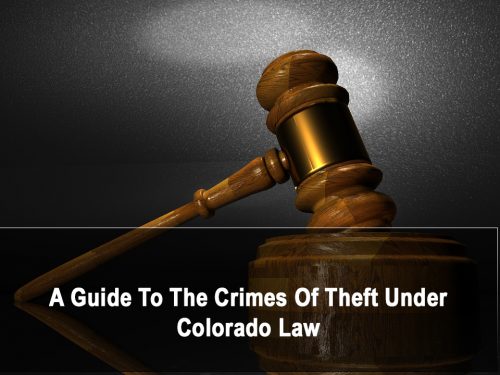
Other Articles of Interest:
- A Guide To The Defense Of Persons With Mental Illness In The Colorado Criminal Justice System
- Colorado Theft – Statute Of Limitations Starts At “Discovery Of The Crime” – 16–5–401 And 18-4-401.




